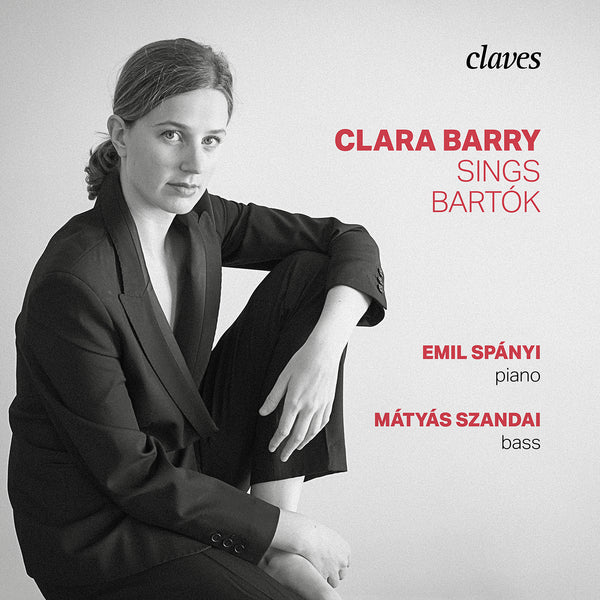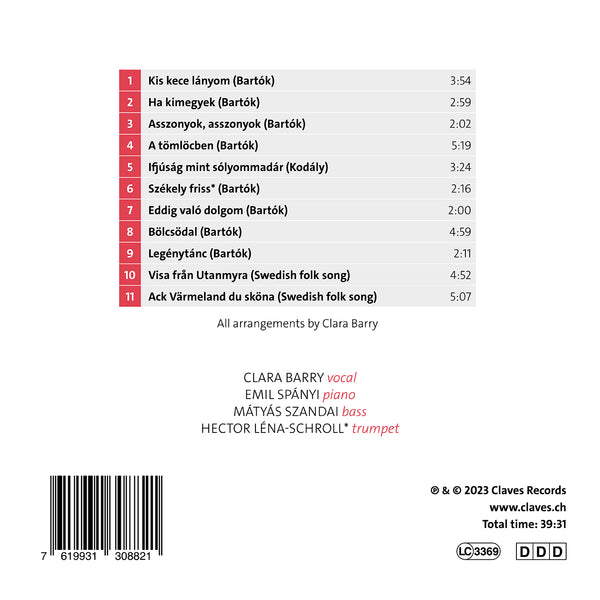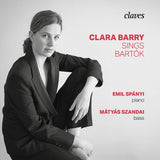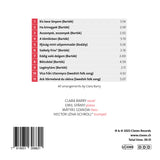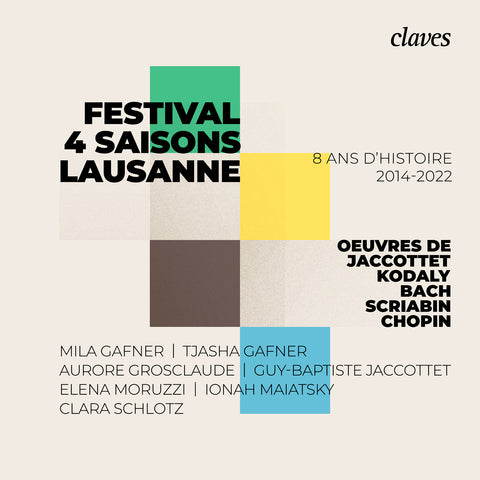(2023) Clara Barry sings Bartók
Category(ies): Debut Oper vocal Piano Folk, popular & Jazz
Instrument(s): Double bass Piano Trumpet
Main Composer: Béla Bartók
CD set: 1
Catalog N°:
CD 3088
Release: 20.10.2023
EAN/UPC: 7619931308821
This album is now on repressing. Pre-order it at a special price now.
CHF 18.50
This album is no longer available on CD.
This album has not been released yet. Pre-order it from now.
CHF 18.50
This album is no longer available on CD.
CHF 18.50
VAT included for Switzerland & UE
Free shipping
This album is no longer available on CD.
VAT included for Switzerland & UE
Free shipping
This album is now on repressing. Pre-order it at a special price now.
CHF 18.50
This album is no longer available on CD.
This album has not been released yet.
Pre-order it at a special price now.
CHF 18.50
This album is no longer available on CD.
CHF 18.50
This album is no longer available on CD.
CLARA BARRY SINGS BARTÓK
CLARA BARRY’S EXPANDED FOLKLORE
While some people’s lives get muddled up in the meanders of complexity, others, on the contrary, dazzle by the clarity of their path, which they follow step by step according to the quiet rhythm of obviousness. It’s as if these steps had called to each other and been arranged in such a way as to offer the face of naturalness. Clara Barry belongs to this second category, and the clarity of a form of quiet logic emanates from her conversation. So much so that she can sum up her life and this album’s programme in the breath of a single sentence: “Although I studied classical violin, I’ve always sung, immersed in this strong tradition of Swedish folk song handed down by my mother. This favoured my encounter with Bartók and led me to present a project based on this mode of transmission so simple and yet so refined, which requires the musicians to display a skilful blend of technique and improvisation.” Eight Bartók pieces, one by Kodály and two Swedish creations: this is the fluid and balanced tribute of a clear idea, but nonetheless the result – since the idea alone is not enough! – of a long maturation process.
“Language is music”
“It took me an enormous amount of time to find the right musicians,” Clara Barry concedes. “When I fell in love with these Bartók pieces and decided to reappropriate them, I first gave it a try with a classical pianist, but it didn’t work out. It was the same thing with jazz musicians. I had to wait until I was preparing for my Bachelor’s recital at the HEMU Jazz in Lausanne for something to happen. The click came when I met two Hungarian musicians, the pianist Emil Spányi and the double bass player Mátyás Szandai. They were the ones who enabled me to find the missing link by making the connection between this intuition that I felt boiling within, in the cauldron of my Swedish heritage, and the roots of their compatriots Béla Bartók and Zoltán Kodály. However, the language remained a significant hurdle. I hadn’t realised how complicated Hungarian would be to master. And there was no question of compromising on this point: the language is itself music, so it would be an absolute betrayal not to master it!”
Taming Hungarian
So here is our singer grappling with words – sounds! – which are usually said to be related to Finnish or Basque, but which, she wonders, might not actually be brothers of Chinese! “At school, I found a Hungarian student who could read all these texts to me slowly and rhythmically so that I could soak up their music and overcome their difficulties, particularly the muscular ones. Hungarian is indeed a language that resembles none other. That’s what gives the whole thing such a strange, unique character. This work on words took over six months. Still, it was essential to do justice to these works, which carry within stories that are over a thousand years old in some cases. They were pulled out of the fragility of oral transmission by Bartók and Kodály, ethnomusicologists before their time who carried their first recorders throughout Eastern Europe and as far as the Orient.
Modernity behind the folklore
The music, polytonal and polymodal in essence, is itself a challenge, particularly regarding intonation. Both Bartók and Kodály did far more than simply transcribe folklore. They drew from these immemorial songs truly modern pieces bearing the recognisable stamp of their own artistic identity. They then had to be articulated in relation to each other to offer the listener a coherent programmatic journey. “This is an essential dimension for me. There is a tendency to relegate it to the background with the advent of new digital consumption habits on listening platforms that split music programmes into playlists, thus transforming how we listen and discover works and artists”. The Hungarian pieces are stylistically very distinctive and unsurprisingly featured as an initial single block. The two jazz arrangements of Swedish folksongs then benefit from an expressive space in the form of a final climax, like a bonus.
Paintings of life
“The coherence concern is the same as for a concert. I begin with the ‘Hungarian Frère Jacques’ Kis Kece Lányom, whose original arrangement sets the tone for the rest of the programme. The text is nonetheless very strange. My Hungarian colleagues themselves struggled to capture the meaning of this very ancient language. Let’s just say that it’s about a father who marries off his daughter... In the interest of contrasting intensity and atmosphere, I decided to continue with two songs for voice and piano. To vary the colouring, I also introduced the trumpet in one of the pieces as part of a fast dance evoking an old woman’s flight into the woods to escape the devil’s clutches. Overall, these are all lovely songs depicting different moments of life – going off to war, marriage, harvest, festivals and their dances – despite a rather sombre and sad predominance.”
Creolisation à la Clara Barry
In short, this is an invitation to be taken as it comes – spontaneously, wholeheartedly, in one go, from A to Z – but it doesn’t tell us who Clara Barry is. Again, unsurprisingly, there are no convolutions: just one line, hers! “I was born in France, but my mother tongue is Swedish, which I speak with my mother and older Swedish sisters. I started studying the violin at the music school when I was six. I was so in love with the instrument that I slept with it! I then joined a special class so that I could intensify my practising. At home, we were immersed in music. Like all Swedes, Mum sang from morning till night. My American father added a touch of jazz to my musical culture: I knew all the Ella & Louis, Broadway musicals, Frank Sinatra and so on by heart. My parents were great music lovers and regularly took us to concerts and the opera. I didn’t start singing until I turned eighteen, possibly because of France’s somewhat meagre popular vocal tradition. Choral singing in churches was one of the mainstays of the vocal tradition, but the French Revolution disrupted it. I then entered the Regional Conservatory, a kind of antechamber to professional studies. It was there that I met Emil Spányi, the man who was to change the course of my life. He is open-minded and free, bearer of a blend of great Hungarian tradition (Bartók and Kodály), Russian studies and jazz improvisation, and has experience in sound engineering, which was invaluable for this recording. I felt immediately connected. When I arrived in Lausanne, I also met Mátyás Szandai, an outstanding double bass player with the same rich classical and jazz education. Like Emil, he was generous enough to enhance my crazy project in the same mind of freedom and anti-partitioning”. To conclude, I share Bartók's belief that in order to renew the musical expression of our time, we must not hesitate to draw on the past to transcend it.
Antonin Scherrer
(Translation: Michelle Bulloch – MUSITEXT)
Clara Barry and Emil Spányi wish to dedicate this album to double bassist Mátyás Szandai, who died tragically on August 28, 2023.
With the support of the City of Lausanne
Clara Barry
Swedish-American-French singer, violinist and composer, she began her musical training with classical violin and graduated from the Conservatoire à rayonnement régional in Paris (CRR). She holds a Master’s degree at the Haute Ecole de Musique de Lausanne in singing. She performed in Parisian venues such as Sunset-Sunside, La Bellevilloise, l’Entrepôt and in Switzerland at the Swiss national radio RTS, in Auditorium Stravinski, Montreux, Chorus Jazz Club in Lausanne and the Youth Olympic Games in Lausanne 2020. She arranges for various groups, and composes for film soundtracks. She works regularly with filmmakers such as Éléonore Geissler.
Read more bios and formation in the booklet
Musicians
CLARA BARRY, vocal
EMIL SPÁNYI, piano
MÁTYÁS SZANDAI (1977-2023), bass
HECTOR LÉNA-SCHROLL, trumpet
Lyrics
Find the translations in English for the lyrics here.
REVIEWS
« Une perle dans le monde du crossover »
« Clara Barry pare les mélodies de Bartók de couleurs jazz. Deux genres musicaux donnent naissance à quelque chose de totalement novateur. »
« Clara Barry tente un pari plus audacieux encore : parer les mélodies de Bartók de couleurs jazz. Tout comme avec les Swingle Singers, certains afficionados seront choqués. Nous sommes sous le charme ! Rappelons l’amitié qui liait le compositeur à Benny Goodman… [..] La mode du crossover, de l’hybridation entre deux genres musicaux n’a pas produit que des chefs-d’œuvre. Ici, nous sommes face à une perle. On ne sacrifie pas un style au détriment d’un autre ( Bartók/Jazz), on tente le pari de fusionner les genres pour créer quelque chose de totalement novateur. Le pari est vraiment gagné. » - Thierry Dagon, juin 2024
“[..] It must have been an extraordinarily difficult project for Barry, realising it through her essentially foreign language, alongside the polytonal and polymodal characteristics of the music. Just as the musicians accompanying her had to pull out all the stops to bring the many richly varied dimensions to the fore. Have the four of them succeeded? Across the board, it sounds less idiomatic to my ears than I had expected at several points, but I do not get much further in that assessment. To which it should be added that the rhythmic profile that characterises these - by no means unfamiliar - songs is after all partly determined by the language. That is why it is so important that these songs are sung in the original language, Hungarian; as here, special in itself. In terms of assessment, then, some modesty befits the reviewer anyway. However, that both vocally and instrumentally a performance of stature is delivered seems to me to be beyond doubt. Moreover, this is repertoire that, certainly as designed as here, is far from commonplace and to which the routine has not been allowed to nibble. [..]” - Aart van der Wal, May 2024
(2023) Clara Barry sings Bartók - CD 3088
CLARA BARRY’S EXPANDED FOLKLORE
While some people’s lives get muddled up in the meanders of complexity, others, on the contrary, dazzle by the clarity of their path, which they follow step by step according to the quiet rhythm of obviousness. It’s as if these steps had called to each other and been arranged in such a way as to offer the face of naturalness. Clara Barry belongs to this second category, and the clarity of a form of quiet logic emanates from her conversation. So much so that she can sum up her life and this album’s programme in the breath of a single sentence: “Although I studied classical violin, I’ve always sung, immersed in this strong tradition of Swedish folk song handed down by my mother. This favoured my encounter with Bartók and led me to present a project based on this mode of transmission so simple and yet so refined, which requires the musicians to display a skilful blend of technique and improvisation.” Eight Bartók pieces, one by Kodály and two Swedish creations: this is the fluid and balanced tribute of a clear idea, but nonetheless the result – since the idea alone is not enough! – of a long maturation process.
“Language is music”
“It took me an enormous amount of time to find the right musicians,” Clara Barry concedes. “When I fell in love with these Bartók pieces and decided to reappropriate them, I first gave it a try with a classical pianist, but it didn’t work out. It was the same thing with jazz musicians. I had to wait until I was preparing for my Bachelor’s recital at the HEMU Jazz in Lausanne for something to happen. The click came when I met two Hungarian musicians, the pianist Emil Spányi and the double bass player Mátyás Szandai. They were the ones who enabled me to find the missing link by making the connection between this intuition that I felt boiling within, in the cauldron of my Swedish heritage, and the roots of their compatriots Béla Bartók and Zoltán Kodály. However, the language remained a significant hurdle. I hadn’t realised how complicated Hungarian would be to master. And there was no question of compromising on this point: the language is itself music, so it would be an absolute betrayal not to master it!”
Taming Hungarian
So here is our singer grappling with words – sounds! – which are usually said to be related to Finnish or Basque, but which, she wonders, might not actually be brothers of Chinese! “At school, I found a Hungarian student who could read all these texts to me slowly and rhythmically so that I could soak up their music and overcome their difficulties, particularly the muscular ones. Hungarian is indeed a language that resembles none other. That’s what gives the whole thing such a strange, unique character. This work on words took over six months. Still, it was essential to do justice to these works, which carry within stories that are over a thousand years old in some cases. They were pulled out of the fragility of oral transmission by Bartók and Kodály, ethnomusicologists before their time who carried their first recorders throughout Eastern Europe and as far as the Orient.
Modernity behind the folklore
The music, polytonal and polymodal in essence, is itself a challenge, particularly regarding intonation. Both Bartók and Kodály did far more than simply transcribe folklore. They drew from these immemorial songs truly modern pieces bearing the recognisable stamp of their own artistic identity. They then had to be articulated in relation to each other to offer the listener a coherent programmatic journey. “This is an essential dimension for me. There is a tendency to relegate it to the background with the advent of new digital consumption habits on listening platforms that split music programmes into playlists, thus transforming how we listen and discover works and artists”. The Hungarian pieces are stylistically very distinctive and unsurprisingly featured as an initial single block. The two jazz arrangements of Swedish folksongs then benefit from an expressive space in the form of a final climax, like a bonus.
Paintings of life
“The coherence concern is the same as for a concert. I begin with the ‘Hungarian Frère Jacques’ Kis Kece Lányom, whose original arrangement sets the tone for the rest of the programme. The text is nonetheless very strange. My Hungarian colleagues themselves struggled to capture the meaning of this very ancient language. Let’s just say that it’s about a father who marries off his daughter... In the interest of contrasting intensity and atmosphere, I decided to continue with two songs for voice and piano. To vary the colouring, I also introduced the trumpet in one of the pieces as part of a fast dance evoking an old woman’s flight into the woods to escape the devil’s clutches. Overall, these are all lovely songs depicting different moments of life – going off to war, marriage, harvest, festivals and their dances – despite a rather sombre and sad predominance.”
Creolisation à la Clara Barry
In short, this is an invitation to be taken as it comes – spontaneously, wholeheartedly, in one go, from A to Z – but it doesn’t tell us who Clara Barry is. Again, unsurprisingly, there are no convolutions: just one line, hers! “I was born in France, but my mother tongue is Swedish, which I speak with my mother and older Swedish sisters. I started studying the violin at the music school when I was six. I was so in love with the instrument that I slept with it! I then joined a special class so that I could intensify my practising. At home, we were immersed in music. Like all Swedes, Mum sang from morning till night. My American father added a touch of jazz to my musical culture: I knew all the Ella & Louis, Broadway musicals, Frank Sinatra and so on by heart. My parents were great music lovers and regularly took us to concerts and the opera. I didn’t start singing until I turned eighteen, possibly because of France’s somewhat meagre popular vocal tradition. Choral singing in churches was one of the mainstays of the vocal tradition, but the French Revolution disrupted it. I then entered the Regional Conservatory, a kind of antechamber to professional studies. It was there that I met Emil Spányi, the man who was to change the course of my life. He is open-minded and free, bearer of a blend of great Hungarian tradition (Bartók and Kodály), Russian studies and jazz improvisation, and has experience in sound engineering, which was invaluable for this recording. I felt immediately connected. When I arrived in Lausanne, I also met Mátyás Szandai, an outstanding double bass player with the same rich classical and jazz education. Like Emil, he was generous enough to enhance my crazy project in the same mind of freedom and anti-partitioning”. To conclude, I share Bartók's belief that in order to renew the musical expression of our time, we must not hesitate to draw on the past to transcend it.
Antonin Scherrer
(Translation: Michelle Bulloch – MUSITEXT)
Clara Barry and Emil Spányi wish to dedicate this album to double bassist Mátyás Szandai, who died tragically on August 28, 2023.
With the support of the City of Lausanne
Clara Barry
Swedish-American-French singer, violinist and composer, she began her musical training with classical violin and graduated from the Conservatoire à rayonnement régional in Paris (CRR). She holds a Master’s degree at the Haute Ecole de Musique de Lausanne in singing. She performed in Parisian venues such as Sunset-Sunside, La Bellevilloise, l’Entrepôt and in Switzerland at the Swiss national radio RTS, in Auditorium Stravinski, Montreux, Chorus Jazz Club in Lausanne and the Youth Olympic Games in Lausanne 2020. She arranges for various groups, and composes for film soundtracks. She works regularly with filmmakers such as Éléonore Geissler.
Read more bios and formation in the booklet
Musicians
CLARA BARRY, vocal
EMIL SPÁNYI, piano
MÁTYÁS SZANDAI (1977-2023), bass
HECTOR LÉNA-SCHROLL, trumpet
Lyrics
Find the translations in English for the lyrics here.
REVIEWS
« Une perle dans le monde du crossover »
« Clara Barry pare les mélodies de Bartók de couleurs jazz. Deux genres musicaux donnent naissance à quelque chose de totalement novateur. »
« Clara Barry tente un pari plus audacieux encore : parer les mélodies de Bartók de couleurs jazz. Tout comme avec les Swingle Singers, certains afficionados seront choqués. Nous sommes sous le charme ! Rappelons l’amitié qui liait le compositeur à Benny Goodman… [..] La mode du crossover, de l’hybridation entre deux genres musicaux n’a pas produit que des chefs-d’œuvre. Ici, nous sommes face à une perle. On ne sacrifie pas un style au détriment d’un autre ( Bartók/Jazz), on tente le pari de fusionner les genres pour créer quelque chose de totalement novateur. Le pari est vraiment gagné. » - Thierry Dagon, juin 2024
“[..] It must have been an extraordinarily difficult project for Barry, realising it through her essentially foreign language, alongside the polytonal and polymodal characteristics of the music. Just as the musicians accompanying her had to pull out all the stops to bring the many richly varied dimensions to the fore. Have the four of them succeeded? Across the board, it sounds less idiomatic to my ears than I had expected at several points, but I do not get much further in that assessment. To which it should be added that the rhythmic profile that characterises these - by no means unfamiliar - songs is after all partly determined by the language. That is why it is so important that these songs are sung in the original language, Hungarian; as here, special in itself. In terms of assessment, then, some modesty befits the reviewer anyway. However, that both vocally and instrumentally a performance of stature is delivered seems to me to be beyond doubt. Moreover, this is repertoire that, certainly as designed as here, is far from commonplace and to which the routine has not been allowed to nibble. [..]” - Aart van der Wal, May 2024
Return to the album | Read the booklet | Composer(s): Béla Bartók | Main Artist: Clara Barry











